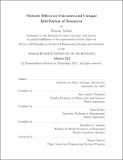Network Effects on Outcomes and Unequal Distribution of Resources
Author(s)
Jahani, Eaman
DownloadThesis PDF (2.929Mb)
Advisor
Pentland, Alex ‘Sandy’
Eckles, Dean
Jackson, Matthew O.
Terms of use
Metadata
Show full item recordAbstract
We focus on the link between networks and economic outcomes, study how networks affect different groups differently and in the process provide pathways to reinforce existing inequalities. First, we establish the link between the economic well-being and the network structure of US counties. We show that counties that are rich with long ties, those bridging different communities, have better outcomes over a range of economic indicators. Subsequently. we study the determinants of long ties and find that they are more frequent if the individual has experienced disruptions such as mobility, migration or switching schools throughout their life. Our findings suggest that creating and maintaining long ties require special skills that co-occur with the above mentioned life events.
Second, we provide observational evidence for differential network advantages in access to information: higher status individuals receive higher marginal benefit from networking. We attribute this phenomena to unequal diffusion due to network homophily and provide causal evidence for it in the context of a randomized seeding experiment in networks.
Third, we develop a network model that captures the structure of unequal diffusion or access to opportunities. We show that any departure from the uniform distribution of links to information sources in a group has both first order and second order effects. Not only some individuals will have fewer direct links, but also the whole group will have fewer diffusion paths to the information sources.
Finally, we examine the network mechanisms that widen inter-group differences. We study an information sharing game, in which individuals have to compete for a rivalrous resource over repeated rounds. The equilibrium predicts lower cooperation among lower status agents, which leads the whole group to receive a “a smaller share of the pie”. We further validate this prediction in an online lab experiment.
We hope that our findings contribute to the growing literature around the network origins of persistent inequality. Our findings suggest that policies that target groups rather than individuals are more successful in combating inequality as the benefits that arise from lifting a whole group out of poverty will be amplified by the existing social capital and the feedback mechanisms present in the network.
Date issued
2022-02Department
Massachusetts Institute of Technology. Institute for Data, Systems, and SocietyPublisher
Massachusetts Institute of Technology